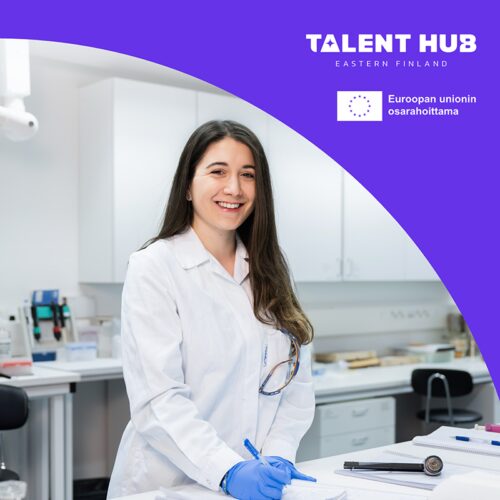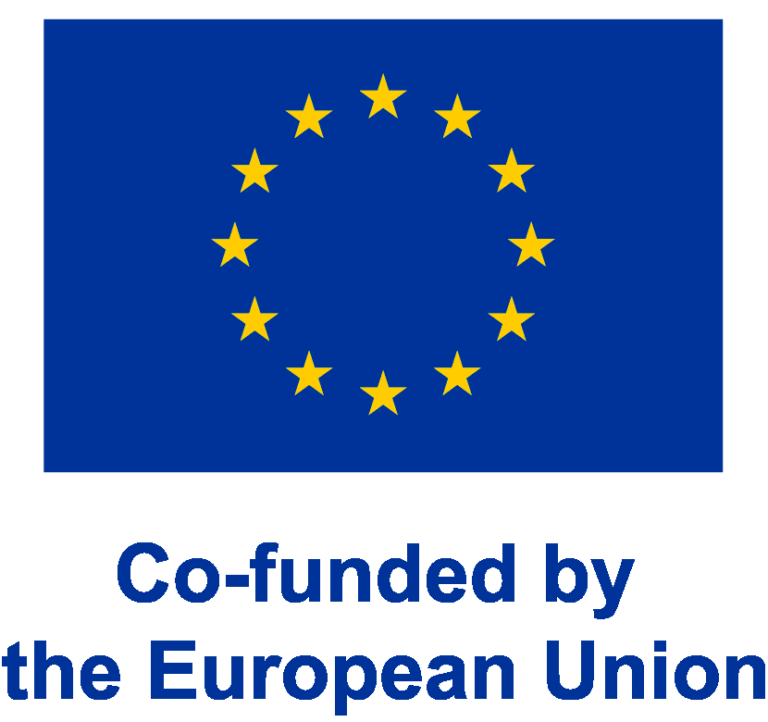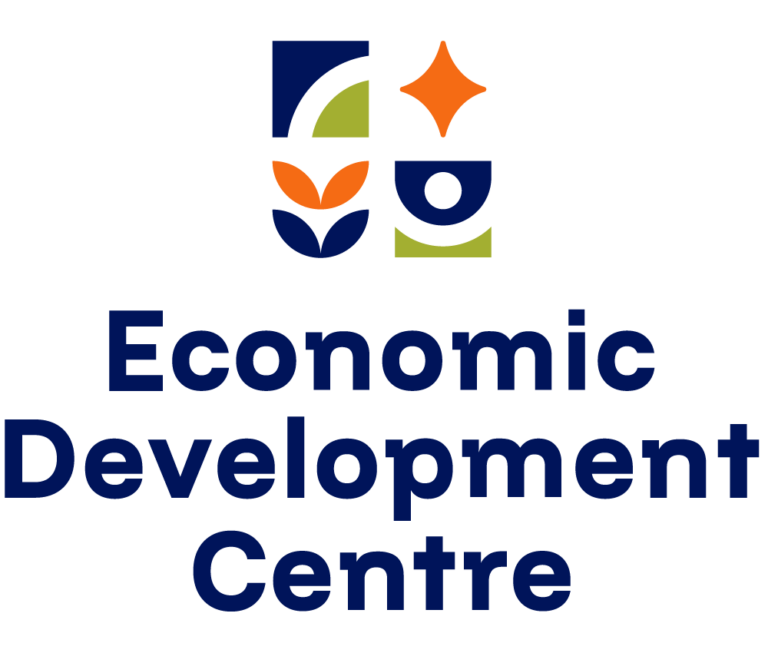
Talent Hub Eastern Finland
Funders


The project is funded by European Social Fund Plus (ESF+). The project is implemented by University of Eastern Finland (coordinator), Savonia University of Applied Sciences, Karelia University of Applied Sciences, North Karelia Municipal Education and Training Consortium, Savo Consortium for Education and Ylä-Savo Municipal Federation of Education.
Leaders
The working-age population in Eastern Finland is expected to decrease to around 25% by 2030 due to retirements and other factors. The birth rate has fallen strongly in recent decades, leading to an acute shortage of workers in many sectors. The University of Eastern Finland plans to respond to the shortage of experts by tripling the number of foreign students by 2030. However, international students in educational institutions across Eastern Finland face great difficulties in finding internships and jobs. Many students would like to stay in the area after graduation, but half of them end up moving elsewhere in search of better employment opportunities. Job offerings and training programs must be aligned so that graduation leads to employment. Furthermore, workplaces, as well as official and leisure services, should operate multilingually to meet the needs of a diverse workforce.
UEF, Karelia, Savonia, Riveria, Sakky and YSAO aim to ensure that international students who come to our region find their place, secure employment, and integrate into Eastern Finland. We will help students get to know Finnish working life, build networks, learn the language, and find internships, jobs and business opportunities. Our goal is for international talent to feel at home and grow their roots in Eastern Finland.
We help employers identify the potential of international students and find a skilled workforce. We offer support and concrete tools for recruiting, onboarding, and learning Finnish at the workplace as well as adapting to the Finnish work culture. Our goal is to lower the threshold for hiring international talent and make it a natural part of organisations’ everyday operations.
Taking care of the vitality of Eastern Finland is our common concern. We need new perspectives, ideas, innovations and opportunities for cooperation. Our region will succeed when we involve everyone in building a common future. Our goal is a welcoming and inclusive Eastern Finland that offers work, livelihood and a good life to everyone living in the region.
News
-
 A match made in heaven
A match made in heavenA match made in heaven
A molecular medicine company, RNatives avoided the recruitment frenzy and hired Yasin Arafat and Nafee Alam, who had impressed during their… -
 Bridging cultures through compassion
Bridging cultures through compassionBridging cultures through compassion
UEF student Yoshitha Vidanagamage champions intercultural communication through kindness and empathy. She dreams of Finland becoming a more inclusive… -
 From Colombia to Joensuu city planning
From Colombia to Joensuu city planningFrom Colombia to Joensuu city planning
Natalia Musikka, who works as a planning architect for the City of Joensuu, is originally from Colombia. An expedition that began with discovering her… -
 A move from Bangladesh to Eastern Finland led to new professional opportunities
A move from Bangladesh to Eastern Finland led to new professional opportunitiesA move from Bangladesh to Eastern Finland led to new professional opportunities
Computer science student Quazi Shahidul Islam is currently doing his master's thesis and working at the speaker manufacturer Genelec. How an…
-
In the online course, you will explore diversity and how to enhance it within the work community. You can access the course from anywhere, at any time, through the DigiCampus online platform (in Finnish): https://digicampus.fi/course/view.php?id=6290.
What the course offers
The course aims to enhance the receptiveness of work communities, foster cultural understanding and cohesion, increase language awareness and support for language learning in the workplace, and strengthen the leadership skills of supervisors.
Upon finishing the course, the participant:
- Understands the significance of diversity in the work community for well-being, interaction and functionality
- Identify their attitudes, privileges and thought patterns that affect their actions in a diverse work community
- Can promote a welcoming, culturally aware and psychologically safe atmosphere in the work community
- Is familiar with ways to support language learning in the workplace
- Recognises phenomena that weaken diversity, such as microaggressions and discriminatory practices, and can act constructively to prevent them
The course topics include:
- The importance of diversity and cultural awareness in the work community
- Receptivity skills and interaction development
- Psychological safety and inclusion
- Language learning in the workplace
- Privileges, biases and microaggressions
During the course
You complete the online course at your own pace, at a time that suits you. The online course consists of five themes, each accompanied by online recordings and corresponding assignments. In each section, you will find a short lecture recording.
You may complete the sections in any order you prefer, or you may choose only the sections that interest you. If you listen to all the sections and finish the assignments, you can print a badge for yourself.
Credits are not awarded for completing the course, and students are not enrolled in the university’s student system, which means that you do not possess a UEF account or student privileges in the university’s systems.
More info on
If you have any questions about the course content, don’t hesitate to contact us!
Virpi Moilanen, [email protected], 050 576 1301
-
The online course Towards Working Life in Eastern Finland supports international students and recent graduates in becoming more familiar with the trends and practices of working life in Eastern Finland. The course contains self-study materials and resources that students can use to learn more about the local way of working, for example, when preparing for their internship.
The course also contains materials and tasks that help identify students’ strengths and competencies concerning the local labour market. The course materials are available in both English and Finnish. The course can be accessed at any time and place using the online DigiCampus platform: https://digicampus.fi/course/view.php?id=5044
Key: MOOC.What the course has to offer
The course is a MOOC (massively open online course) that aims to build competence, confidence, and comfort (the 3 Cs) in international students living, studying, and working in eastern Finland.
After completing the course, students can:
- Understand some basic concepts of working life in Finland
- Recognise some frameworks involved in Finnish society and culture
- Describe their expertise and strengths concerning working life
- Process and search for information related to the labour market and services that support international students
Some course topics include:
- Working life and welfare society in Finland
- Key features of workplace culture
- Rights and responsibilities of employees and employers
- Generic and transferable skills in modern working life
- The application and recruitment process
- Competence recognition
- Networking
During the course
After registering to the e-learning platform on DigiCampus, students can directly access all modules and course materials. Students can flexibly use the course materials, taking course modules in any order depending on individual needs and interests. Students can also use self-assessment tools, learning tasks and a learning portfolio to explore the themes of working life and identify their strengths and skills. Coursework and learning tasks are not evaluated or accredited at this time.
More information
Do not hesitate to get in touch for questions and support related to the course content!
Sami Tanskanen, [email protected], +358 50 355 8857
Soile Ruotsalainen, [email protected], +358 50 476 5668 -
The group mentoring programme brings together employers, experts from different fields, and international students (actors). An independent expert or an employer organisation with one or more experts can act as a mentor in the programme. The main role of mentors is to challenge and guide actors to develop their working life and networking skills. The mentoring language is English.
The themes of mentoring meetings can be, for example:
- Professional growth and career development
- Identification and marketing of one’s competence
- Job search skills
- Networking
- Finnish culture and working life
- Getting to know the organisation and industry
- Entrepreneurship and (research) funding
- Well-being at work and time management
Mentoring provides mentors and employer organisations with the following:
- Positive employer visibility and an opportunity to implement social responsibility at the local level
- A chance to get acquainted with the skills of international students and an opportunity to recruit
- New perspectives and innovative ideas
- Up-to-date information on fields of education and the future workforce
- A chance to network and get to know different cultures
- An opportunity to develop coaching, interaction and language skills
As students taking part in the mentoring programme, you will improve your skills in
- job search and getting to know different career options and paths
- developing professional expertise and finding your strengths
- communication and interaction with others
- building professional networks
- developing self-confidence and self-knowledge
Stages of the mentoring programme (November-May)
- Online coaching for participants in the mentoring programme (2 h)
- Programme launch event and first online meeting of groups (2 h)
- Meetings with the group (4-5 times recommended)
- Networking event (3 h)
- Programme closing event (3 h)
The key stages of the mentoring process are 2nd and 3rd. The program lasts approximately 20 hours per mentor. Mentoring is not tied to the locality but can be done online.
Students choose a suitable mentoring group based on a mentor profile written by the mentor/employer organisation themselves. The mentoring groups agree on the method of conducting the meetings (remote and/or face-to-face meetings).
The dates for the next mentoring programme (November 2025-May 2026) can be found in this brochure (pdf).
Additional information
Feel free to contact us!
Marko Pietilä, [email protected], +358 40 355 3039
Minna Tarvainen, [email protected], +358 44 785 6981
Sanna Jeskanen, [email protected], +358 50 462 2478 -
Future Talents Team bridges the gap between academia and industry by fostering collaboration between companies and students. The team meets with local employers and presents degree programmes and the competencies of international students. The aim is to achieve many kinds of cooperation: theses, internships, project and part-time work, as well as small case examples for courses.
Collaboration offers the employer
- new, fresh development ideas
- recruiting possibilities
- an opportunity to increase the linguistic and cultural competence of the work community
- an easy way to collaborate with educational institutions
- engagement with higher education, research and innovation
- positive employer visibility
- possibility to implement social responsibility at the local level
Benefits for the students
- network with other students and local employers – a chance to gain more employment opportunities
- get to know Finnish working life, culture and language
- participate in sales and marketing trainings held by an expert
- develop their skills in problem solving, sales and negotiation, project and teamwork
- possibility to gain study credits
Service process
- The student teams can visit or be invited to local companies
- During the visits, the teams and employers discuss cooperation opportunities and agree on the next steps
- The partnership continues, and the student teams monitor the progress as agreed
For more information:
Paavo Raappana, [email protected], +358 50 465 9027
Johanna Taavitsainen, [email protected], +358 44 785 6142
Marko Pietilä, [email protected], +358 40 355 3039
Sami Tanskanen, [email protected], +358 50 355 8857 -
The service seeks the best and most efficient way for people from different educational and competence backgrounds to progress and find employment. The persons involved in counselling work at educational institutions in the ROPO team work together to develop measures that would best enable graduating and newly graduated international students to find employment.
The counselling uses the study offerings of the student’s educational institution and partner institutions involved in the project. It also cooperates with employers and operators in the employment area.
Benefits for the customer
Solution-oriented study counselling (ROPO) serves international students and employers.
Solution-oriented study counselling offers
- knowledge and skills for a successful job search
- personal guidance also for graduated students
- information about study opportunities from other educational institutions in the project
- contacts and meetings with companies at different types of events
- International job seekers for companies
- opportunities for cooperation for companies with different fields of education and counsellors
Service process
Solution-oriented study counselling (ROPO) includes:
- Mapping the personal situation with the educational institution’s supervisor
- Familiarisation with the study offerings of different educational institutions and guidance to postgraduate studies
- Job search workshops and, for example, MOOCs in different fields of education of educational institutions
- Alumni activities of graduating students
- Various recruitment and training events guiding and supporting individual students
- Guidance assistance to students and alumni as the service process progresses
Educational institution students are admitted to the service at the end of their studies. Alumni activities allow students to receive support after graduation. The aim is to make cooperation with companies continuous, flexible, and beneficial for all parties.
Additional information
Feel free to contact us!
Juhani Lantto, [email protected], +358 44 785 3355
Hanna Reinikainen, [email protected], +358 44 016 2643
Mervi Keinänen, [email protected], +358 50 331 5823 -
Skills passports are made for different fields of study to support and strengthen students’ competence demonstration. The skills passport is a straightforward document that jobseekers use to describe themselves and their skills. This makes it easier for the employer to understand the skills and work experience of the job applicant when applying for a job. In addition to the jobseeker’s assessment, the skills passport includes feedback from vocational teachers and working life.
Skills passports are made for upper secondary-level students, such as care assistants, practical nurses, facility managers, bakers, chefs, waiters, and sheet metal welders. Draft skills passports have also been prepared for university students specialising in expert positions and chemistry.
Benefits for the customer
When looking for a job, immigrants often face challenges due to their lack of language skills. This makes it more difficult to showcase one’s skills and find employment.
Students can use the skills passport
- as an attachment in a job application
- in a job interview
- for replacing CV and job application
- when drafting a CV and job application
The skills passport brings concrete results to the presentation of skills when applying for a job. It also helps the employer find the right person for each job.
Service process
Skills passports are created for different fields together with teachers and representatives of working life. At the final stage of graduation, students fill in a skills passport in their field, in which they evaluate their working life, professional, and language skills with the teacher and write a motivation letter about themselves.
Additional information
For more information, please feel free to contact us!
Sari Väänänen, [email protected], +358 44 785 4025
Pauliina Korhonen, [email protected], +358 44 785 3403 -
The entrepreneurship path for international students provides comprehensive support for students who want to develop their business idea and start as entrepreneurs. The service includes the following areas:
- Course: The aim of the course is to help students develop realistic and feasible business ideas. In higher education institutions, the course is called Realistic Business Idea in English, and in vocational schools, it is called Realistinen liikeidea selkeällä suomella.
- Personal coaching: Students receive support in developing their business ideas in individual and group coaching.
- Business idea evaluation and development: Students work on the business idea independently and with the support of coaching meetings.
- Creating a contact network: The course coaches support students in growing their contacts and advancing their business ideas.
- Digital community: The goal is to develop a digital community for international budding entrepreneurs. The community provides peer support and networking opportunities.
The course is aimed at those planning to start a business. The digital community is also intended for international students and graduates who have already started their business.
Benefits for students
- Business idea development: The student receives support and guidance in developing the business idea.
- Learning the language of business administration and entrepreneurship: Students learn to use business concepts that facilitate collaboration with business advisors and financiers.
- Networking and strengthening of social capital: The student creates contacts with other entrepreneurs, experts and potential partners.
Service path from the student’s perspective
Course
- Initial interview and orientation: Students attend a kick-off session where they get an overview of the program and objectives.
- Independent work on a business idea: Students work on their own business idea independently and receive guidance and sparring at this stage.
- Coaching meetings: In coaching meetings, students receive feedback and guidance on how to develop their business idea.
- Final examination: Students present their business ideas and demonstrate their competence.
- Letter of recommendation: Successful students receive a letter of recommendation, which can be used, for example, in funding applications.
Digital community
An international student or entrepreneur can join the digital community supported by the project. This gives them opportunities to make online and face-to-face contacts and promote networking with their operating environment and other entrepreneurs.
Additional information
Daniel Bågeberg, [email protected], +358 50 324 0290
Riku Jalonen, [email protected], +358 44 785 8360
Heidi Wilska, [email protected], +358 50 577 7852 -
Educational institutions’ alumni activities offer graduates a variety of services. The services depend on the educational institution, but professional further education, alumni meetings, and cooperation with working life are common forms of alumni activities. Alumni can also participate in institutions’ activities after graduation, for example, by mentoring students or inviting student groups to workplace visits.
Benefits of alumni activities
- Development of professional competence through continuous learning, further studies and continuing education
- Strengthening working life networks both among alumni and between students and representatives of working life
- Opportunity to participate in the development of education as a working life partner
Join alumni activities
You can register as an alumnus or with a separate form upon graduation. Check out the alumni activities of your educational institution and join us!
UEF
https://www.uef.fi/en/uef-alumni
[email protected]
Savonia UAShttps://www.savonia.fi/en/savonia-uas/explore-savonia/join-the-alumni-network/
[email protected]
Karelia UAShttps://www.karelia.fi/en/alumni-activities/
[email protected]
SAKKYhttps://sakky.fi/fi/koulutukset/alumnitoiminta-maahanmuuttaneille
[email protected]
Riveria -
We collect information about our international students, including their fields of expertise, previous education, and work experience. This information helps us find talent suitable for employers’ needs as trainees or employees.
The information is compiled based on systematically repeated student surveys. Based on the students’ responses, an expanding Talent Pool database has already been formed. The Talent Pool enables targeted meetings between international students and employers.
Utilising the database in practice
The employer can notify the Talent Hub Eastern Finland network of their need for additional resources. Based on the request for information, the Talent Pool database is searched for students with the desired profile. With the students’ consent, they are presented to the employer, who then decides on further actions. If a suitable expert is found among the students, they get the internship, thesis or job they want, and the employer gets a new employee in their work community. Our experts are available throughout the process.
Additional information
Johanna Taavitsainen, [email protected], +358 44 785 6142
Eini Puhakka, [email protected], +358 44 785 6825
Marko Pietilä, [email protected], +358 40 355 3039
Sanna Jeskanen, [email protected], +358 50 462 2478
-
Workplace instructor training supports employers, especially workplace instructors, in guiding international students in the workplace. The training consists of a two-hour face-to-face training and a virtual material package open to all. The experiences and results of the Teams support sessions, a service piloted for workplace instructors, will be utilised to prepare the training and material.
Benefits for employers, workplace tutors and students
The training allows employers to increase language and cultural awareness and courage in hiring international talent. An organisation can make language and culturally aware guidance skills visible by applying for a badge. The workplace instructor receives concrete tools for guiding international students. Students benefit from the guidance skills of workplace instructors as they progress in their studies and integrate into the work community.
Service path from the employer’s point of view
YSAO is piloting the Language and Culture-Aware Workplace Instructor training as a face-to-face implementation in technology expertise and food services. The organisation receives a badge after completing the training.
Alternatively, the educational institution’s website has a material bank for Language—and Culture-Aware Workplace Instructors containing concrete everyday tools. When an employer has a workplace instructor familiar with the material, the employer can receive a badge for language and culture-conscious guidance.
Additional information
Mirja Iskanius, [email protected], +358 40 558 5454
Minna Jääskeläinen, [email protected], +358 50 300 7102
Pauliina Korhonen, [email protected], +358 44 785 3403
Maarit Paaso, [email protected], +358 50 347 6696 -
The service model for employers offers a comprehensive set of services aimed at responding to companies’ recruitment needs and improving the vitality of Eastern Finland. Employers receive information about graduating students and experts applying for internships, theses and project work through the service.
The service model will be developed in cooperation with the education, employment and economic development services of counties and municipalities, and it will be targeted especially at small and medium-sized employers.
Benefits for the customer
The service model for employers offers many benefits to employers:
- A well-functioning cooperation network that brings together companies, educational institutions and other service providers in the area
- Up-to-date and reliable information on the international workforce and its utilisation possibilities
- Practical tools and training that facilitate training, recruitment and attachment to the work community
- A better understanding of degree programmes, fields of study and the experts they offer
Service process
The employer’s service path often begins with situations where the company has:
- Shortage of labour
- The need to recruit international talent, but this may be hindered by, for example, perceived difficulties in paperwork, language skills problems or occupational safety issues
- A desire to develop export operations or expand operations internationally
The service process proceeds according to an individual service path, where the employer’s needs are first mapped. After that, solutions are built that connect job seekers and employers.
Additional information
Feel free to contact us!
Sari Väänänen, [email protected], +358 044 785 4025
Pauliina Korhonen, [email protected], +358 044 785 3403 -
The regions’ smart specialisation industries have formed several industry clusters. In addition, other well-established consortia in Eastern Finland focus on the needs of different sectors and are often coordinated by regional development companies.
Industry clusters create a strong foundation for developing effective cooperation models between companies, public organisations, vocational colleges and higher education institutions.
The services offered to the clusters can be tailored to each sector, communications can be targeted, and operations can be directed to the right customer group. This makes the collaboration more impactful and customer-oriented.
The objectives of cluster cooperation are to
- improve recruitment skills in working life
- produce targeted training information for companies
- help students of different levels of education and employers working within the same field to meet each other
Benefits for the customer
Companies and organisations in clusters and industry consortia receive up-to-date and reliable information about international students and their skills. In addition, the degree programmes and fields of study of educational institutions will become better known to the representatives of working life involved in the clusters.
The aim is that the benefits brought by international students become concrete for companies and thus lower the threshold for recruiting international experts. In addition, we produce content related to international experts for cluster- and industry-specific events.
Service process
The services available to employers and the benefits of international experts are highlighted, for example, through case studies in meetings organised by clusters and divisions as well as other events. After this, further measures are planned together, which may affect all or only some of the companies in the sector.
Additional information
Feel free to contact us!
Sari Väänänen, [email protected], +358 44 785 4025
Pauliina Korhonen, [email protected], +358 44 785 3403
Keywords
Leaders
Contact persons
-

Marko Pietilä
International Affairs SpecialistStrategy and Communication Services, University Services -

Maria Saastamoinen
Project SpecialistCentre for Continuous Learning -

Lasse Reijonen
Academic Affairs SecretaryCentre for Continuous Learning -

Soile Ruotsalainen
Research TraineeSchool of Educational Sciences and Psychology, Philosophical Faculty -

Päivi Vestala
Project ManagerCentre for Continuous Learning -

Virpi Moilanen
Continuous Learning SpecialistCentre for Continuous Learning -

Sanna Iskanius
Director of TrainingCentre for Continuous Learning -

Hanna Reinikainen
Career CounsellorStudent and Learning Services, University Services -

Sami Tanskanen
Project CoordinatorSchool of Educational Sciences and Psychology, Philosophical Faculty -

Tiina Weman
Communications specialistStrategy and Communication Services, University Services
